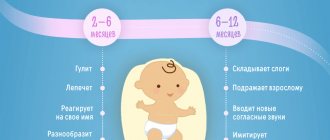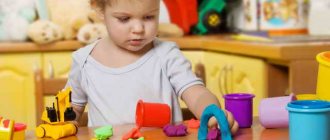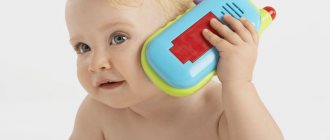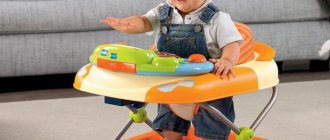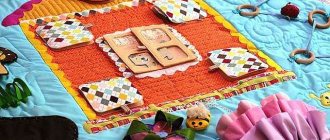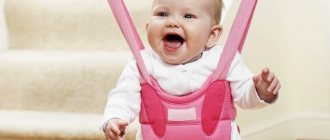Preschool education is not only preparing a child for school, but also creating the most comfortable conditions for the versatile and harmonious development of the individual, training imagination, memory, logical thinking, and analytical abilities. Some parents choose to work independently, others prefer to entrust their child’s early education to special children’s centers for the development of intelligence, where teachers work according to well-known programs. What contributes to the comprehensive development of a child? What methods do teachers use and what are the advantages of each of them?
The importance of preschool child development
The development of a child at an early age consists of creating the necessary conditions that facilitate the productive acquisition of knowledge and skills. These factors include the organization of the environment - filling the space with objects that develop auditory and visual memory. Also, from early childhood, a child should be introduced to literary and musical works, which have a great influence on the formation of his artistic taste in the future. It is very important to stimulate the development of children's speech. To do this, parents and the whole family need to actively communicate with the child, voice their actions, and use special educational materials. It is recommended to develop a child’s abilities from an early age so that he goes to school prepared. Then heavy learning loads will not become stressful for him, the baby will skillfully cope with the assigned tasks and enjoy the learning process. Children who study at an early age using known methods are distinguished by a higher and more serious level of intellectual development. Educational programs make it possible to determine the inclinations and inclinations of a child even at preschool age. Classes in children's development centers promote the active socialization of the child, teach them how to build relationships in a team and express their point of view.
Lettergram
Parents also often pay attention to the methods of children’s speech development. After all, all fathers and mothers strive to ensure that their child’s speech apparatus develops correctly. “Literogram” will be a real helper for such parents. This is a program developed by S. Shishkova. Its author is a candidate of psychological sciences.
When creating her theory and methodology for speech development in children, S. Shishkova used the principles of defectology, speech therapy and neuropsychology. Its system is designed for preschool children who are restless and weakly concentrating on the material, as well as for teenagers. The main purpose of using this technique is to activate the child’s attention and memory while simultaneously correcting all types of speech. Such problems are solved by conducting exciting activities included in the program. In this case, mental work alternates with physical exercise and breathing training. Shishkova's program consists of twenty classes that must be performed regularly.
Judging by the reviews of parents, this technique is quite effective. It allows a child to develop speech, memory and attention in a short time.
Popular techniques
There are several time-tested methods of preschool development of children, which are used by parents when working independently and by child development centers in the classroom. But no method will be ideal, since each child is an individual with his own psychophysical characteristics. What suits one child may be completely incomprehensible to another. When choosing a system, parents should carefully study the advantages and disadvantages of each of them.
Maria Montessori's method was developed in the 20th century. It is aimed at revealing the child’s mental potential and his creative abilities. The basic principle of the program is that parents and teachers refuse to interfere in the child’s activities until the child himself asks for help. In the traditional version, the method offers classes for children from three years old. The advantages of the system are the development of self-discipline, organization and a sense of responsibility, as well as a wide selection of developmental aids. A special feature of the method is the emphasis on logical thinking, so it will be more difficult for creative individuals to master skills using it, as well as the rejection of the role-playing game format and expensive consumables.
The Waldorf school emphasizes the development of the child’s imagination and imagination, so artistic activity is the main one here. According to the methodology, children do not solve intellectual problems until they are 7 years old, and grades are not given in lessons. The educational process is as comfortable as possible and all attention is paid to creativity.
Glen Doman's method is based on four components: encyclopedic knowledge, reading, physical education and counting. The task of parents is to fully realize the physical capabilities of the baby. The main material for classes are cards that depict points, plants and animals, birds, celebrities and simple arithmetic operations. The big advantages of the system are the active involvement of parents in the educational process and the development of the child’s attention.
Zaitsev’s methodology assigns the main role to gaming activities. This contributes to the development of the child’s physical and psychological characteristics. Children are easily included in classes, as a conducive environment is created for them. They are not forbidden to stomp their feet, change the game, switch and clearly show their emotions. But this form of learning is not fun. It is effective because the child better assimilates new knowledge and learns to choose appropriate activities. Using this system, you can study both at home and in groups in preschool institutions. The technique is distinguished by a wide age range and persistent development of writing skills.
The Nikitins’ methodology does not recommend limiting children’s devices, but giving them the opportunity to experiment. Parents help the child overcome difficulties, but the kids themselves choose the activities that interest them. The system is based on a game format of classes, it develops the child’s independence and intelligence, much attention is paid to physical development and improvement of logical thinking. Each educational system has a number of its advantages and disadvantages.
When choosing a teaching method, you should focus on the individual characteristics of the child. The task of parents and teachers is to carefully observe the child’s behavior and reaction. All exercises in the system must be understandable, and the training itself must be comprehensive. It is necessary to stimulate the child’s interest, passion, desire to learn and observe. It is important to correctly assess the child’s capabilities and know the nuances of the chosen training program so that classes demonstrate positive results.
Gyenish method
This technique involves the development of logical thinking in a child. When conducting classes with its use, children develop mathematical skills, analytical abilities and develop combinatorics.
The presented list of early development methods is far from exhaustive. There are quite a large number of them. Parents must decide for themselves which one to choose to educate their child.
Comprehensive development of children
The child's versatility will become a reliable foundation for his future self-realization. You should not focus on the child’s humanitarian or mathematical abilities; it is important to develop his memory, imagination, and creative inclinations, which, with the right approach, can develop into abilities, and then into talents.
The physical development of a child is to maintain the child’s shape and health, intellectual development is to improve creative and rational thinking, and increase mental capabilities. Social development means the ability to express one’s thoughts and ideas, improving communication skills, since it is impossible to live in society and be free from it. Emotional development makes it possible to control your feelings and emotions, understand other people’s experiences, and manage yourself. The creative development of a child contributes to the revelation of his potential, and spiritual development - the acceptance of generally known values, rules and moral norms, and observance of moral principles. The above systems are an excellent help in raising a harmoniously developed personality. One of the popular and sought-after techniques is mental arithmetic.
Children grow up healthy and smart
Innovative teachers, Boris and Elena Nikitin, raised seven children in their family. Their education method is based on the active use of various games in teaching children and communicating with them . The Nikitins’ method is also known for the fact that in their upbringing they paid great attention to the health of children, their hardening , even to the point of wiping them with snow and bathing in ice water. The Nikitins themselves developed many manuals for children - puzzles, problems, pyramids, cubes. This method of education has caused controversial reviews from the very beginning, and currently opinions about it are ambiguous.
Mental arithmetic and undeniable advantages of development methods
Mental arithmetic is based on mental calculations. In Russia, the technique began to be used relatively recently, but has already proven its effectiveness. Mental arithmetic creates a solid basis for self-realization. Thanks to this course, academic performance in many school subjects improves, and a wide variety of creative and intellectual abilities are revealed.
During mental arithmetic classes, a child’s visual, auditory and emotional memory improves. The technique teaches children to quickly perceive new information, and their overall level of performance in school increases. The courses develop creative thinking, creative inclinations, imagination, attentiveness and patience, develop leadership qualities and interest in the learning process.
The skills that mental arithmetic courses instill at the AMAKids Children's Academy for the Development of Intelligence are effective for the intellectual development of children. Age category – from 5 to 16 years. The child will study with professional teachers and will be given lessons in a playful way. The program is designed in such a way that children can master the material efficiently. In the first lesson, they can become familiar with physical and mental abacus. Within a month, children learn to quickly and correctly solve simple mathematical examples in their heads, and after two months of lessons, the child can combine the computational process with reciting a poem. Over the course of a year, the child masters all the rules of subtraction and addition, and at the end of the course he can easily use his knowledge in mental calculation. Classes are held in small groups. The maximum number of participants is 10 people.
If your child is already five years old and can count from one to ten, then you have the opportunity to sign up for a trial lesson!
Features of Maria Montessori's research
Maria Montessori is an Italian doctor of medicine who developed a unique approach to teaching both weakened and absolutely healthy children. The basis of the Montessori system is very simple - ideal conditions must be created for the child that will help him develop and learn independently. This approach ensures the early acquisition of important life experiences and develops the sensory and motor skills necessary for a certain age.
Useful: What should a child be able to do at three months?
Using absorbent thinking and increased age-related sensitivity as starting points, Maria Montessori built an education scheme focused on developing the individuality and personality of the little person on her own.
Basic recommendations of the Montessori system:
- Building learning around game practice.
- Introduction of classes on the development of writing, reading, correct speech, everyday skills, sensory indicators.
- Provoking the involvement of the child’s own thinking, rather than mechanical completion of tasks.
- Maria Montessori suggested using toys with a large number of small parts, which has a positive effect on children’s fine motor skills.
According to the Montessori system, the following patterns of skill formation can be distinguished:
- Until the age of six, children's sensory development occurs.
- By the age of 3, the perception of order is formed.
- At the age of 1-4 years, movements and actions are formed.
- By the age of 6, the basics of speech are formed.
- After 2.5 and up to 6 years, social skills are developed.
As Montessori teaches, lost time is irreplaceable. If appropriate work is not carried out with the baby during one of the indicated periods, then the opportunity to develop an important ability will be gone forever.
Related materials:
training | form of training | technique | institute | control | lectures | preparation | students | task | task
Articles
- Exam anxiety: how to overcome it? December 27, 2013, 00:00
- Education abroad without leaving your computer April 4, 2014, 00:00
- October, session... October 31, 2015, 23:30
Video
- Dior Beauty Institute January 27, 2009, 19:00
- Lev Goncharov: Ideal hand shape October 12, 2009, 00:03
- Idylle by Guerlain. History of creation October 25, 2011, 11:03

